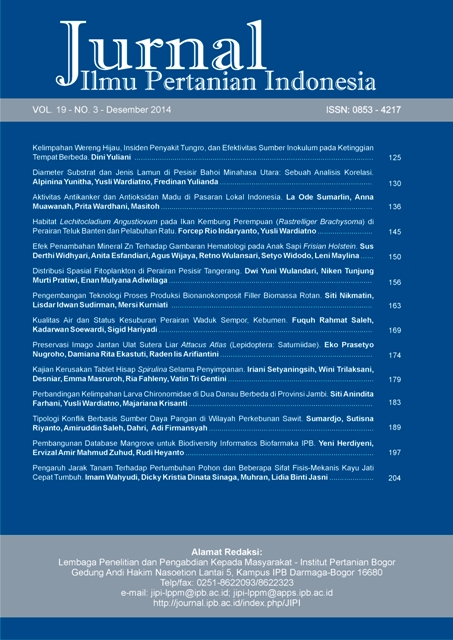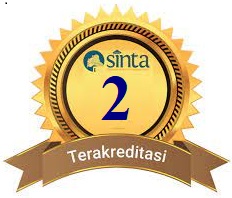Pembangunan Database Mangrove untuk Biodiversity Informatics Biofarmaka IPB
Abstract
Mangroves are a source of traditional medicine that can be used as a source of bioactive compounds. With the conversion of mangrove ecosystem into another designation led to the extinction of mangrove ecosystems. Therefore we need a good management of natural resources. In natural resource management, biodiversity information is needed to sustain the species utilization, exploration potential of the species and their biological and ecological monitoring, policy making, and for the development of biotechnology innovation. Research center of IPB Biopharmaca (Institute for Research and Community Services of Bogor Agricultural University) has the mandate to conduct research from upstream to downstream in the medicinal field. This study develops Indonesian mangrove biodiversity database for Biodiversity Informatics. Biodiversity informatics (BI) is the development of computer-based technologies for the management of biodiversity information. BI can be used to improve the knowledge management (knowledge management), exploration, analysis, synthesis, and interpretation of data ranging from the level of genomic biodiversity, species level to the ecosystem level. From the results of this study are expected data, information and knowledge of natural wealth mangroves can be managed properly so that the preservation of natural resources can be properly maintained and can be used in particular to the field of medicinal studies.
Downloads
References
Achmad SA. 2004. Kimia Bahan Alam, Suatu Pendekatan untuk Memahami Potensi Keanekaragaman Hayati dalam Bioindustri, Prosiding Seminar Nasional, Universitas Airlangga, Surabaya, 5 September 2004, 1-25.
Antoniou G, van Harmelen F. 2004. A Semantic Web Primer, The MIT Press, ISBN 0262012103.
Beard CB, Pye G, Steurer FJ, Salinas Y, Campman R, Peterson AT, Ramsey JM, Wirtz RA, Robinson LE. 2002. Chagas disease in a domestic transmission cycle in southern Texas, USA. Emerging Infectious Diseases. 9: 103-105.
Costa J, Peterson AT, Beard CB. 2003. Ecological niche modeling and differentiation of populations of Triatoma brasiliensis Neiva, 1911, the most important Chagas disease vector in northeastern Brazil (Hemiptera, Reduviidae, Triatominae). The American Journal of Tropical Medicine and Hygiene. 67(5): 516-520.
Diastuti H, Suwandri. 2009. Fraksinasi dan Identifikasi Senyawa Antikanker Ekstrak Kulit Batang Rhizopora mucronata serta Uji Toksisitasnya terhadap Larva Udang (Artemia salina Leach). Jurnal Molekul. 4(2): 1-10.
Diastuti H, Warsinah, Purwati. 2008. Isolasi Senyawa Bioaktif sebagai Bahan Antikanker pada Tanaman Rhizopora mucronata, Laporan Penelitian Hibah Bersaing I. Purwokerto (ID): Universitar Jenderal Soedirman.
Gaikwad JA. 2011. Digitisation and analysis of customary medicinal plant knowledge using biodiversity informatics. [Tesis]. New South Wales (AU): University Sydney.
Harwoko, Utami ED. 2010. Aktivitas Sitotoksik Fraksi n-Heksana: Kloroform dari ekstrak methanol kulit batang mangrove (Rhizopora mucronata) pada sel kanke myeloma. Majalah Obat Tradisional. 15-55.
Lakitan B. 2012. Pengelolaan Sumber daya Kelautan Berbasis IPTEK untuk kemakmuran bangsa. Seminar Nasional Kelautan VIII. Universitas Hang Tuah Surabaya.
Pariyono. 2006. Kajian Potensi Kawasan Mangrove Dalam Kaitannya Dengan Pengelolaan Wilayah Pantai Di Desa Panggung, Bulakbaru, Tanggultlare, Kabupaten Jepara. [Tesis]. Semarang (ID): Universitas Diponegoro.
Pearson RG, Dawson TP, Berry PM, Harrison PA. 2002. SPECIES: A spatial evaluation of climate impact on the envelope of species. Ecological Modelling. 154(3): 289-300.
Peterson AT, Vieglais DA. 2001. Predicting species invasions using ecological niche modeling: new approaches from bioinformatics attack a pressing problem. BioScience. 51(5): 363-371.
Peterson AT, Shaw JJ. 2003. Lutzomyia vectors for cutaneous leishmaniasis in southern Brazil: Ecological niche models, predicted geographic distributions, and climate change effects. International Journal of Parasitology. 33(9): 919-931.
Peterson AT. 2003. Predicting the geography of species’ invasions via ecological niche modeling. The Quarterly Review of Biology. 78(4): 419-433.
Riswan S, Andayaningsih D. 2008. Keanekaragaman Farmasi Indonesia. Jurnal Farmasi Indonesia. 4(2): 96-103.
Saenger P, Hegerl EJ, Davie JDS. 1983. Global Status of Mangrove Ecosystems. IUCN Commission on Ecology Papers No. 3, Gland (SZ).
Soetarno S. 2000. Potensi dan Manfaat Tumbuhan Mangrove sebagai Sumber Bahan Bioaktif. Acta Pharmaceutica Indonesia. 12 (4): 84-103.
Soerianegara I. 1987. Masalah Penentuan Batas Lebar Jalur Hijau Hutan Mangrove. Prosiding Seminar III Ekosistem Mangrove. Jakarta (ID).
Raxworthy CJ, Martínez-Meyer E, Horning N, Nussbaum RA, Schneider GE, Ortega-Huerta MA, Peterson AT. 2003. Predicting distributions of known and unknown reptile species in Madagascar. Nature. 426: 837-841.
Siqueira MF, Peterson AT. 2003. Consequences of global climate change for geographic distributions of cerrado tree species. Biota Neotropica. 3(2): 2-14. http://www.biotaneotropica.org.br/.
Thomas CD, Cameron A, Green RE, Bakkenes M, Beaumont LJ, Collingham YC, Erasmus BFN, de Siqueira MF, Grainger A, Hannah L, Hughes L, Huntley B, van Jaarsveld AS, Midgley GF, Miles L, Ortega-Huerta MA, Peterson AT, Phillips OL, Williams SE. 2004. Extinction risk from climate change. Nature. 427: 145-148.
Tomlinson PB. 1986. The Botany of Mangroves. Cambridge University Press, Cambridge (UK).
Wightman GM. 1989. Mangroves of the Northern Territory. Northern Territory Botanical Bulletin No. 7. Conservation Commission of the Northern Territory, Palmerston, NT (AU).
This journal is published under the terms of the Creative Commons Attribution-NonCommercial 4.0 International License. Authors who publish with this journal agree to the following terms: Authors retain copyright and grant the journal right of first publication with the work simultaneously licensed under a Creative Commons Attribution-NonCommercial 4.0 International License. Attribution — You must give appropriate credit, provide a link to the license, and indicate if changes were made. You may do so in any reasonable manner, but not in any way that suggests the licensor endorses you or your use. NonCommercial — You may not use the material for commercial purposes.



















